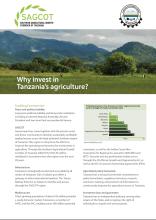Land Library
Welcome to the Land Portal Library. Explore our vast collection of open-access resources (over 74,000) including reports, journal articles, research papers, peer-reviewed publications, legal documents, videos and much more.
/ library resources
Showing items 82 through 90 of 258.Land degradation is severe in the steep sloping highlands in eastern Africa; natural resource management is central to good governance and increasing enfranchisement of rural people.
Government has come together with the private sector and donor community to develop sustainable, profitable agribusinesses across the high-potential Southern region of Tanzania. This region is a key focus for efforts to improve the operating environment for investments in agriculture.
The Southern Agricultural Growth Corridor of Tanzania (“SAGCOT”) has been established as a public private partnership with the objective to enhance Tanzania’s food security and accelerate agricultural transformation.
Tanzania has a long history of sugar cane production and it has now a prioritized national policy to attract foreign investments into modern and industrial scale sugar cane production. Between 2001 and 2010, the production of sugar in Tanzania increased from 130,000 Mt pa to 280,000 Mt pa.
The founding document of SAGCOT, the Investment Blueprint, was developed by the founding partners encompassing government, donor partners, farmers, and the private sector. The SAGCOT Investment Blueprint details the objectives of SAGCOT and how these will be achieved.
This project combines efforts of Canadian civil society and Nigerian communities to better understand the Reducing Emissions From Deforestation and Degradation (REDD) process to further environmental sustainability in forest dependent communities.
We draw on empirical results from three case studies of property rights change across forest and fisheries ecosystems in central Vietnam to investigate the circumstances under which collective property rights may make sense. A
The security of women’s entitlement to land and land-based resources in the East Africa region has been compromised by a combination of unfavourable laws and government policies, socio-economic change toward greater commoditization of and competition for land and land-based resources, and exclusi
Owing to the fact that women have different knowledge, access to, and control over resources, and different opportunities to participate in decisions regarding resource use and management from men, the study focuses on gendered differences in livelihood strategies, identifying factors that preclu









